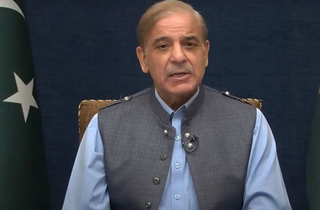The newly formed National Assembly, Pakistan's lower house of parliament, elected Sharif on Sunday with 201 votes, leading a fragile alliance that excludes supporters of jailed opposition leader Imran Khan.
"The Islamic Republic of Pakistan has declared Shehbaz Sharif as the prime minister," announced the newly appointed speaker of the National Assembly, Sardar Ayaz Sadiq.
Omar Ayub Khan emerged as the preferred candidate for Members of Parliament supporting Khan, securing 92 votes in his challenge against Sharif.
Pakistan's national assembly comprises 336 members, with 266 elected through direct voting and 70 appointed. Among the appointed members, 60 seats are reserved for women and 10 for representatives of religious minorities.
To assume power, a political party or alliance needs at least 169 seats in the national assembly, with nominee selection based on electoral performance.
Sharif, aged 72, is the younger brother of three-time Prime Minister Nawaz Sharif, who led the Pakistan Muslim League-Nawaz (PML-N) party's election campaign.
While candidates supported by Khan won the most seats, the PML-N and the Pakistan Peoples Party formed a coalition government, paving the way for Shahbaz Sharif's re-election as prime minister as his brother stepped aside.
Sharif previously served as prime minister until August last year when the National Assembly was dissolved ahead of national elections.
The Feb. 8 elections in Pakistan were marked by controversy, with incidents of mobile internet shutdowns, arrests, and violence. Delayed results prompted allegations of vote rigging and electoral fraud.
Throughout Pakistan's 77-year history, no prime minister has completed a full five-year term, largely due to the significant political influence exerted by the military. (ILKHA)



 Güncel
Güncel
 Güncel
Güncel
 Dünya
Dünya
 Dünya
Dünya
 Güncel
Güncel
 Güncel
Güncel
 Sağlık
Sağlık
 Güncel
Güncel
 Güncel
Güncel
 Güncel
Güncel





